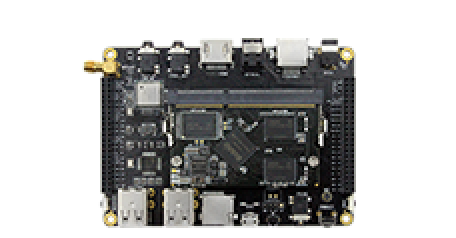ADB 使用
更新时间:2017-09-15 阅读:4386
目录
前言
adb,全称 Android Debug Bridge,是 Android 的命令行调试工具,可以完成多种功能,如跟踪系统日志,上传下载文件,安装应用等。
准备连接
在开发板上进入选项->开发人员选项,勾上 "USB 调试" 选项。
用 Micro USB OTG 线连接设备和主机。
Windows下的 ADB 安装
首先参照安装 RK USB 驱动一节安装好驱动。
然后到 http://adbshell.com/download/download-adb-for-windows.html 下载 adb.zip,解压到 C:\adb 以方便调用。
打开命令行窗口,输入:
cd C:\adb adb shell
如果一切正常,就可以进入adb shell,在设备上面运行命令。
Ubuntu 下的 ADB 安装
安装 adb 工具:
sudo apt-get install android-tools-adb
加入设备标识:
mkdir -p ~/.android vi ~/.android/adb_usb.ini # 添加以下一行 0x2207
加入 udev 规则:
sudo vi /etc/udev/rules.d/51-android.rules
# 添加以下一行:
SUBSYSTEM=="usb", ATTR{idVendor}=="2207", MODE="0666"
重新插拔 USB 线,或运行以下命令,让 udev 规则生效:
sudo udevadm control --reload-rules sudo udevadm trigger
重新启动 adb 服务器
sudo adb kill-server adb start-server
常用 ADB 命令
连接管理
列出所有连接设备及其序列号
adb devices
如果有多个连接设备,则需要使用序列号来区分:
export ANDROID_SERIAL=<设备序列号> adb shell ls
可以通过网络来连接 adb:
# 让设备端的 adbd 重启,并在 TCP 端口 5555 处监听 adb tcpip 5555 # 此时可以断开 USB 连接 # 远程连接设备,设备的 IP 地址是 192.168.1.100 adb connect 192.168.1.100:5555 # 断开连接 adb disconnect 192.168.1.100:5555
调试
获取系统日志 adb logcat
用法
adb logcat [选项] [应用标签]
示例
# 查看全部日志 adb logcat # 仅查看部分日志 adb logcat -s WifiStateMachine StateMachine
运行命令 adb shell
获取详细运行信息 adb bugreport
adb bugreport 用于错误报告,里面包含大量有用的信息。
示例
adb bugreport # 保存到本地,方便用编辑器查看 adb bugreport >bugreport.txt
root 权限
如果 TARGET_BUILD_VARIANT 使用的是 userdebug 模式,要获得 root 权限,需要先运行:
adb root
让 adb 的设备端切换到 root 权限模式,这样 adb remount 等需要 root 权限的命令才会成功。
应用管理
安装应用 adb install
用法:
adb install [选项] 应用包.apk
选项包括:
-l forward-lock -r 重新安装应用,保留原先数据 -s 安装到 SD 卡上,而不是内部存储
示例:
# 安装 facebook.apk adb install facebook.apk # 升级 twitter.apk adb install -r twitter.apk
如果安装成功,工具会返回成功提示 "Success";失败的话,一般是以下几种情况
INSTALL_FAILED_ALREADY_EXISTS: 此时需要用 -r 参数来重新安装。
INSTALL_FAILED_SIGNATURE_ERROR: 应用的签名不一致,可能是发布版和调试版签名不同所致。如果确认 APK 文件签名正常,可以用 adb uninstall 命令先卸载旧的应用,然后再安装。
INSTALL_FAILED_INSUFFICIENT_STORAGE: 存储空间不足,需要检查设备存储情况。
卸载应用 adb uninstall
用法:
adb uninstall 应用包名称
示例:
adb uninstall com.android.chrome
应用包名称可以用以下命令列出:
adb shell pm list packages -f
运行结果是:
... package:/system/app/Bluetooth.apk=com.android.bluetooth ...
前面是 apk 文件,后面则是对应的包名称。
命令行帮助信息 adb help
Android Debug Bridge version 1.0.31
-a - directs adb to listen on all interfaces for a connection
-d - directs command to the only connected USB device
returns an error if more than one USB device is present.
-e - directs command to the only running emulator.
returns an error if more than one emulator is running.
-s <specific device> - directs command to the device or emulator with the given
serial number or qualifier. Overrides ANDROID_SERIAL
environment variable.
-p <product name or path> - simple product name like 'sooner', or
a relative/absolute path to a product
out directory like 'out/target/product/sooner'.
If -p is not specified, the ANDROID_PRODUCT_OUT
environment variable is used, which must
be an absolute path.
-H - Name of adb server host (default: localhost)
-P - Port of adb server (default: 5037)
devices [-l] - list all connected devices
('-l' will also list device qualifiers)
connect <host>[:<port>] - connect to a device via TCP/IP
Port 5555 is used by default if no port number is specified.
disconnect [<host>[:<port>]] - disconnect from a TCP/IP device.
Port 5555 is used by default if no port number is specified.
Using this command with no additional arguments
will disconnect from all connected TCP/IP devices.
device commands:
adb push [-p] <local> <remote>
- copy file/dir to device
('-p' to display the transfer progress)
adb pull [-p] [-a] <remote> [<local>]
- copy file/dir from device
('-p' to display the transfer progress)
('-a' means copy timestamp and mode)
adb sync [ <directory> ] - copy host->device only if changed
(-l means list but don't copy)
(see 'adb help all')
adb shell - run remote shell interactively
adb shell <command> - run remote shell command
adb emu <command> - run emulator console command
adb logcat [ <filter-spec> ] - View device log
adb forward --list - list all forward socket connections.
the format is a list of lines with the following format:
<serial> " " <local> " " <remote> "\n"
adb forward <local> <remote> - forward socket connections
forward specs are one of:
tcp:<port>
localabstract:<unix domain socket name>
localreserved:<unix domain socket name>
localfilesystem:<unix domain socket name>
dev:<character device name>
jdwp:<process pid> (remote only)
adb forward --no-rebind <local> <remote>
- same as 'adb forward <local> <remote>' but fails
if <local> is already forwarded
adb forward --remove <local> - remove a specific forward socket connection
adb forward --remove-all - remove all forward socket connections
adb jdwp - list PIDs of processes hosting a JDWP transport
adb install [-l] [-r] [-d] [-s] [--algo <algorithm name> --key <hex-encoded key> --iv <hex-encoded iv>] <file>
- push this package file to the device and install it
('-l' means forward-lock the app)
('-r' means reinstall the app, keeping its data)
('-d' means allow version code downgrade)
('-s' means install on SD card instead of internal storage)
('--algo', '--key', and '--iv' mean the file is encrypted already)
adb uninstall [-k] <package> - remove this app package from the device
('-k' means keep the data and cache directories)
adb bugreport - return all information from the device
that should be included in a bug report.
adb backup [-f <file>] [-apk|-noapk] [-obb|-noobb] [-shared|-noshared] [-all] [-system|-nosystem] [<packages...>]
- write an archive of the device's data to <file>.
If no -f option is supplied then the data is written
to "backup.ab" in the current directory.
(-apk|-noapk enable/disable backup of the .apks themselves
in the archive; the default is noapk.)
(-obb|-noobb enable/disable backup of any installed apk expansion
(aka .obb) files associated with each application; the default
is noobb.)
(-shared|-noshared enable/disable backup of the device's
shared storage / SD card contents; the default is noshared.)
(-all means to back up all installed applications)
(-system|-nosystem toggles whether -all automatically includes
system applications; the default is to include system apps)
(<packages...> is the list of applications to be backed up. If
the -all or -shared flags are passed, then the package
list is optional. Applications explicitly given on the
command line will be included even if -nosystem would
ordinarily cause them to be omitted.)
adb restore <file> - restore device contents from the <file> backup archive
adb help - show this help message
adb version - show version num
scripting:
adb wait-for-device - block until device is online
adb start-server - ensure that there is a server running
adb kill-server - kill the server if it is running
adb get-state - prints: offline | bootloader | device
adb get-serialno - prints: <serial-number>
adb get-devpath - prints: <device-path>
adb status-window - continuously print device status for a specified device
adb remount - remounts the /system partition on the device read-write
adb reboot [bootloader|recovery] - reboots the device, optionally into the bootloader or recovery program
adb reboot-bootloader - reboots the device into the bootloader
adb root - restarts the adbd daemon with root permissions
adb usb - restarts the adbd daemon listening on USB
adb tcpip <port> - restarts the adbd daemon listening on TCP on the specified port
networking:
adb ppp <tty> [parameters] - Run PPP over USB.
Note: you should not automatically start a PPP connection.
<tty> refers to the tty for PPP stream. Eg. dev:/dev/omap_csmi_tty1
[parameters] - Eg. defaultroute debug dump local notty usepeerdns
adb sync notes: adb sync [ <directory> ]
<localdir> can be interpreted in several ways:
- If <directory> is not specified, both /system and /data partitions will be updated.
- If it is "system" or "data", only the corresponding partition
is updated.
environmental variables:
ADB_TRACE - Print debug information. A comma separated list of the following values
1 or all, adb, sockets, packets, rwx, usb, sync, sysdeps, transport, jdwp
ANDROID_SERIAL - The serial number to connect to. -s takes priority over this if given.
ANDROID_LOG_TAGS - When used with the logcat option, only these debug tags are printed.












